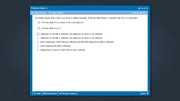An integer greater than 1 that is not prime is called composite. If the two digit integer n is greater than 20 , is n composite ?
1) The tens digit of n is a factor of the units digit of n .
2) The tens digit of n is 2 .
Target question: Is n composite?
Given: n > 20
Statement 1: The tens digit of n is a factor of the units digit of n
It doesn't take long to list the 2-digit numbers that satisfy this condition:
22, 24, 26, 28
33, 36, 39
44, 48
55
66
77
88
99
ALL of these possible values of n are composite, so
n must be composite.
Since we can answer the
target question with certainty, statement 1 is SUFFICIENT
Statement 2: The tens digit of n is 2.
There are several values of n that meet this condition. Here are two:
Case a: n = 21, in which case
n is composite
Case b: n = 23, in which case
n is not composite
Since we cannot answer the
target question with certainty, statement 2 is NOT SUFFICIENT
Answer =
A
Cheers,
Brent
